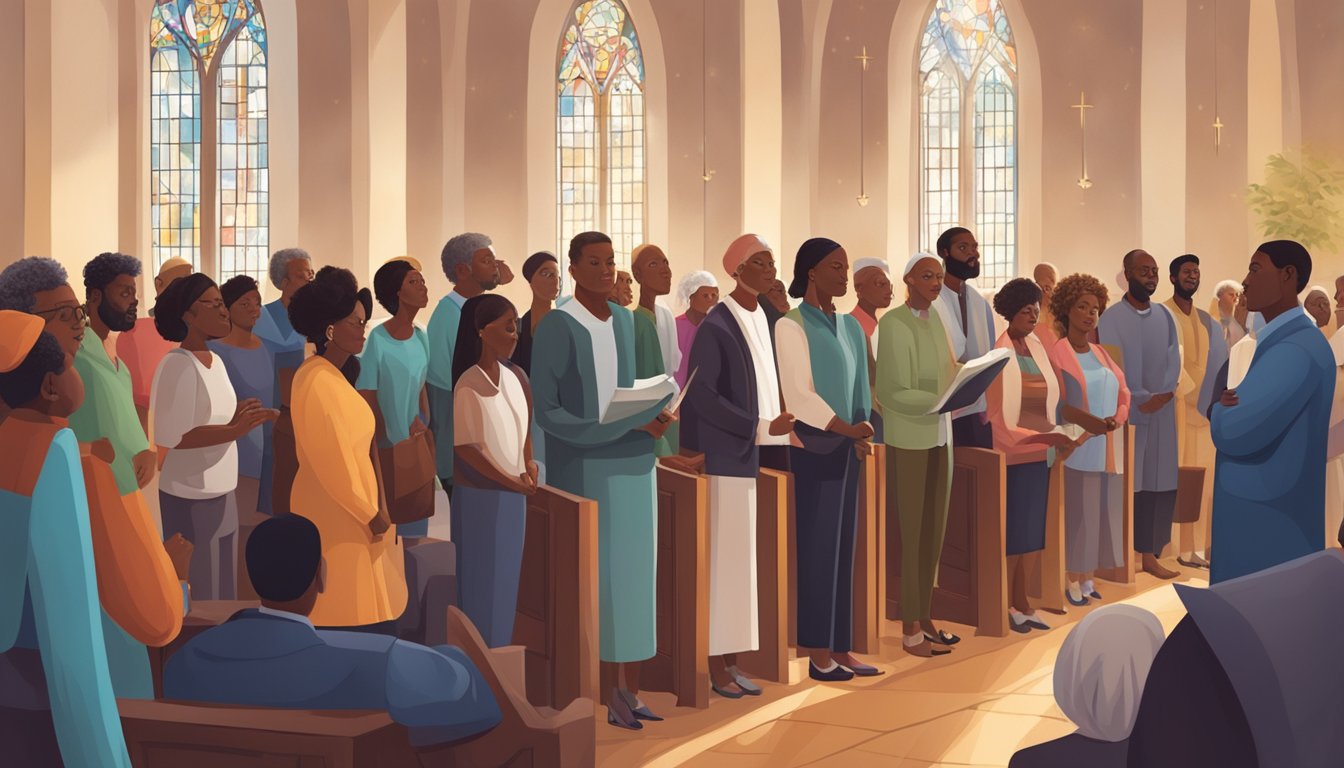Christians and Gentiles are two distinct groups of people. Gentiles are non-Jewish people, while Christians are followers of Jesus Christ. The question of whether a Christian is a Gentile is an interesting one that has been debated for centuries. Some argue that since Christianity originated in the Jewish community, Christians are not Gentiles. Others argue that since Christianity is a distinct religion, Christians are Gentiles.

Defining Gentiles and Christians is an essential first step in understanding whether a Christian is a Gentile. The term “Gentile” refers to non-Jewish people, while “Christian” refers to followers of Jesus Christ. The Bible teaches that Jesus Christ was a Jew, and his followers were also Jews. However, Christianity eventually spread beyond the Jewish community and became a distinct religion. This has led to debate over whether Christians are Gentiles or not.
Key Takeaways
- Christians are followers of Jesus Christ, while Gentiles are non-Jewish people.
- The question of whether a Christian is a Gentile has been debated for centuries.
- Defining Gentiles and Christians is an essential first step in understanding whether a Christian is a Gentile.
Defining Gentiles and Christians
Gentile Origins and Meaning

The term “Gentile” is derived from the Latin word “gentilis,” which means “of or belonging to a nation.” In the Bible, the term is used to refer to anyone who is not Jewish. The concept of Gentiles can be traced back to the Old Testament, where it was used to distinguish between Jews and non-Jews. Gentiles were often referred to as “the nations” or “the heathen.”
The term “Gentile” is also used in the New Testament, where it is often used by the Apostle Paul to refer to non-Jewish people. Paul, who was a Jew himself, was instrumental in spreading Christianity to the Gentiles. He believed that the message of Jesus Christ was not just for Jews, but for all people, regardless of their background.
Christian Identity
Christians, on the other hand, are followers of Jesus Christ. They believe that Jesus is the Son of God and that he died on the cross to save humanity from sin. Christians are not a separate race or ethnicity, but rather a group of people who share a common faith.
In the early days of Christianity, most of the followers were Jews. However, as the message of Jesus spread, more and more non-Jewish people began to convert to Christianity. These people were considered Gentiles by the Jewish community, but they were welcomed into the Christian faith with open arms.
Today, Christianity is a global religion with followers from all over the world. Christians come from a variety of ethnic and cultural backgrounds, and they speak many different languages. Despite their differences, they share a common belief in Jesus Christ and a commitment to living a life of faith and service.
In conclusion, while Gentiles and Christians are not the same thing, the two terms are often used in conjunction with each other. Gentiles are non-Jewish people, while Christians are followers of Jesus Christ. While the two groups are distinct, they share a common history and a common goal of spreading the message of Jesus to all people, regardless of their background.
Biblical Context of Gentiles
https://www.youtube.com/watch?v=dCDUqTpH5XQ&embed=true
The term Gentile is used in the Bible to refer to anyone who is not Jewish. The concept of Gentiles is present in both the Old and New Testaments. In this section, we will explore the biblical context of Gentiles.
Gentiles in the Old Testament
In the Old Testament, the term Gentile usually referred to non-Israelite people. Abraham was called by God to be the father of many nations, and his descendants became the Israelites. The Israelites were God’s chosen people, and the Old Testament laws and commandments were given to them through Moses. However, there were several instances where God interacted with Gentiles in the Old Testament.
For example, in the book of Jonah, God sent Jonah to preach to the people of Nineveh, a Gentile city. The people of Nineveh repented, and God forgave them. In the book of Ruth, a Moabite woman named Ruth became a follower of the God of Israel and married an Israelite man named Boaz. The story of Ruth is a beautiful example of how God can use Gentiles to accomplish His purposes.
Gentiles in the New Testament

In the New Testament, the term Gentile is used to refer to non-Jewish people. The gospel of Jesus Christ was first preached to the Jews, but it was also intended for the Gentiles. In the book of Acts, we read about how the apostles began to preach the gospel to the Gentiles.
The conversion of Cornelius, a Roman centurion, is one of the most significant events in the early church. Peter was sent to Cornelius by God, and he preached the gospel to him and his household. They all believed and were baptized, and the Holy Spirit was poured out on them. This event showed that the gospel was for everyone, not just the Jews.
In the book of Romans, Paul explains that salvation is available to both Jews and Gentiles. He writes, “For I am not ashamed of the gospel, for it is the power of God for salvation to everyone who believes, to the Jew first and also to the Greek” (Romans 1:16). Paul also emphasizes that Gentiles are grafted into the tree of salvation, just as the Jews are (Romans 11:17-24).
In conclusion, the Bible teaches that Gentiles are an important part of God’s plan of salvation. While the Old Testament laws and commandments were given to the Israelites, the gospel of Jesus Christ is intended for everyone. Through faith in Jesus Christ, both Jews and Gentiles can be saved and become part of God’s family.
Jesus Christ and the Gentiles
https://www.youtube.com/watch?v=SJR4pMRXn5c&embed=true
Jesus Christ’s ministry was not limited to the Jewish people only. He interacted with many Gentiles during his time on earth. In this section, we will explore Jesus’ interactions with the Gentiles and his teachings on Gentiles and salvation.
Jesus’ Interaction with Gentiles
« Is “Hold On” a Christian Song? Exploring the Religious Themes in Popular Music
Is Gratitude a Christian Song? Exploring the Relationship Between Music and Faith »
Jesus had many interactions with Gentiles throughout his ministry. One of the most notable interactions was with a Roman centurion who had a sick servant. The centurion had great faith in Jesus and believed that he could heal his servant from a distance. Jesus was amazed by the centurion’s faith and healed the servant as he had requested.
Another notable interaction was with a Syrophoenician woman who begged Jesus to heal her daughter. At first, Jesus seemed hesitant to help her because she was a Gentile, but she persisted, and Jesus eventually healed her daughter.
Teaching on Gentiles and Salvation
Jesus’ teachings on Gentiles and salvation are clear. In the Gospel of Matthew, Jesus commands his disciples to “go and make disciples of all nations” (Matthew 28:19). This commandment includes the Gentiles, and Jesus’ ministry was not limited to the Jewish people only.
Jesus also taught that salvation is available to everyone, regardless of their nationality or ethnicity. In the Gospel of John, Jesus says, “For God so loved the world that he gave his one and only Son, that whoever believes in him shall not perish but have eternal life” (John 3:16). This statement is a clear indication that salvation is available to everyone, not just the Jewish people.

In conclusion, Jesus Christ’s ministry was not limited to the Jewish people only. He interacted with many Gentiles and taught that salvation is available to everyone, regardless of their nationality or ethnicity.
The Apostles and the Gentile Mission
https://www.youtube.com/watch?v=NL2Gt2riSY0&embed=true
The early Christian church was primarily composed of Jewish converts, and it took some time for the apostles to understand that the message of Jesus was meant for all people, not just Jews. The mission to the Gentiles began with Peter and continued with the ministry of Paul.
Peter and the Roman Centurion
Peter was the first apostle to be called to convert Gentiles to Christianity. In Acts 10, Peter is visited by a Roman centurion named Cornelius, who had a vision from God telling him to send for Peter. Peter had a vision of his own, in which he was told that he should not consider any person unclean or impure. He then went to Cornelius’ house, and after hearing Cornelius’ story, Peter baptized Cornelius and his entire household. This was a significant moment in the early church, as it marked the first time that a Gentile had been welcomed into the Christian community.
Paul’s Ministry to the Gentiles
Paul is known as the apostle to the Gentiles, and his ministry was instrumental in spreading the message of Jesus to non-Jewish people. Paul believed that the message of Jesus was meant for everyone, and he traveled extensively throughout the Mediterranean world, preaching to both Jews and Gentiles. He founded many churches, and his letters to these communities make up a significant portion of the New Testament.

Paul’s ministry to the Gentiles was not without controversy, however. Some Jewish Christians believed that Gentile converts should be required to follow Jewish customs, such as circumcision and dietary laws. In Acts 15, a council was held in Jerusalem to discuss this issue, and it was ultimately decided that Gentile converts did not need to follow these customs. This decision was a significant moment in the early church, as it allowed Christianity to become a truly universal faith.
In conclusion, the mission to the Gentiles was a crucial part of the early Christian church, and it was led by both Peter and Paul. While there were some disagreements about how to approach Gentile converts, ultimately the message of Jesus was spread throughout the world, and Christianity became a truly universal faith.
Conversion and Integration
https://www.youtube.com/watch?v=tNpVV5bHJfc&embed=true
Gentiles Joining the Early Church
In the early days of Christianity, there was a significant debate about whether Gentiles could become Christians without first converting to Judaism and following the Mosaic Law, which included circumcision. However, this view was challenged by the apostle Paul, who argued that Gentiles could be saved through faith in Jesus Christ alone, without the need for circumcision or adherence to the Jewish Law. This doctrine was eventually accepted by the early church, and Gentiles began to join the Christian community in large numbers.
Cultural and Religious Challenges
The integration of Gentiles into the early Christian community was not without its challenges. Many Jewish Christians struggled to accept Gentile converts, who came from different cultural and religious backgrounds. This led to tensions and conflicts within the church, which were exacerbated by the fact that Gentiles did not have the same understanding of the Jewish scriptures and traditions as Jewish Christians.

To address these challenges, the early church developed a set of guidelines for Gentile converts, known as the Council of Jerusalem. This council affirmed that Gentiles did not need to be circumcised or follow the Mosaic Law, but should instead abstain from certain practices, such as eating meat sacrificed to idols and consuming blood. These guidelines helped to ease tensions between Jewish and Gentile Christians and allowed the church to continue to grow and thrive.
Overall, the integration of Gentiles into the early Christian community was a complex and challenging process, but it ultimately helped to shape the doctrine and practices of the church. By accepting Gentiles as full members of the community, the early church was able to spread the message of Christianity to a wider audience and establish itself as a global religion.
Key Figures and Stories
Ruth the Moabite
Ruth was a Moabite woman who married a Jewish man and became a convert to Judaism. Her story is told in the biblical book of Ruth, which is traditionally read during the Jewish holiday of Shavuot. Ruth’s story is one of loyalty and devotion, as she declares her willingness to follow her mother-in-law, Naomi, back to Israel and to adopt Naomi’s God as her own. Ruth’s faithfulness is rewarded when she meets Boaz, a wealthy landowner who takes an interest in her and eventually marries her.
Ruth’s story is significant because it shows that conversion to Judaism is possible, even for someone who is not born into the Jewish faith. This is important because it demonstrates that Judaism is a religion that is open to all who wish to embrace it, regardless of their background or ethnicity.
Cornelius the Centurion

Cornelius was a Roman centurion who is mentioned in the New Testament book of Acts. He is notable because he was the first Gentile to be converted to Christianity. Cornelius was a devout man who feared God and gave generously to the poor. One day, he received a vision from an angel who instructed him to send for Peter, one of Jesus’ disciples.
Peter came to Cornelius’ house and preached the gospel to him and his household. As Peter spoke, the Holy Spirit came upon Cornelius and his family, and they were baptized. This event was significant because it demonstrated that the message of salvation was not just for the Jews, but for all people, regardless of their ethnicity or background.
Cornelius’ conversion also had a profound impact on the early Christian church, as it helped to break down the barriers between Jews and Gentiles and paved the way for the spread of Christianity throughout the Roman Empire.
Theological Implications
Gentiles and the Covenant
The concept of the Covenant is central to Christian theology. In the Old Testament, God made a covenant with Abraham, promising that his descendants would become a great nation and that all nations would be blessed through him. This covenant was renewed with Moses, and later with David. The New Testament teaches that Jesus Christ is the fulfillment of this covenant, and that through faith in Him, both Jews and Gentiles can become part of the people of God.

Gentiles, or non-Jewish people, were not part of the original covenant with Abraham. However, the New Testament teaches that through faith in Jesus Christ, Gentiles can become part of the people of God and inherit the promises of the covenant. This is a radical departure from the traditional Jewish view that only Jews could be part of the chosen people.
The Concept of the Chosen People
The concept of the chosen people is also central to Christian theology. In the Old Testament, God chose the Israelites as His people, and made a covenant with them. This covenant included promises of land, descendants, and blessings, but also required obedience to God’s laws.
In the New Testament, the concept of the chosen people is expanded to include both Jews and Gentiles who have faith in Jesus Christ. This means that the promises of the covenant, including salvation, are available to all who believe, regardless of their ethnic background.
Overall, the theological implications of the relationship between Gentiles and the covenant, and the concept of the chosen people, are central to Christian theology. By understanding these concepts, Christians can better understand their place in God’s plan and their relationship with Him.
Social and Cultural Dynamics
Jew-Gentile Relations in History

The relationship between Jews and Gentiles has been a complex and often contentious one throughout history. The term “Gentile” refers to anyone who is not Jewish, and historically, the Jewish people have been a distinct minority in many societies. This has led to a variety of social and cultural dynamics between Jews and Gentiles over the centuries.
In many cases, Jews have been marginalized and discriminated against by Gentile societies. This has often been due to their status as a minority group, as well as their religious and cultural differences. For example, in medieval Europe, Jews were often subjected to violence and persecution, and were frequently accused of various crimes and conspiracies.
However, there have also been periods in history where Jews and Gentiles have coexisted peacefully and even cooperatively. In some cases, Jews have been able to integrate into Gentile societies and become valued members of those communities. For example, during the Golden Age of Spain, Jews were able to flourish in the fields of science, philosophy, and the arts, and made significant contributions to Spanish culture and society.
Gentiles in the Jewish Community
While much of the historical focus has been on the relationship between Jews and Gentiles, it is also worth considering the role of Gentiles within the Jewish community. In many cases, Gentiles have been welcomed into Jewish communities and have been able to participate in Jewish religious and cultural practices.
For example, in ancient times, there were many Gentiles who were attracted to Judaism and converted to the faith. These converts, known as “proselytes,” were fully integrated into Jewish society and were considered to be Jews themselves. Similarly, in modern times, many Gentiles have been welcomed into Jewish communities and have been able to participate in Jewish religious and cultural events.

Overall, the relationship between Jews and Gentiles has been a complex and multifaceted one throughout history. While there have been periods of conflict and tension, there have also been times of cooperation and integration. Today, many Jews and Gentiles work together to promote social and cultural harmony, and to build bridges between their respective communities.
Modern Interpretations and Views
Contemporary Christian Perspectives
In contemporary Christianity, the term “Gentile” is often used to refer to non-Jewish individuals. While the term has historically been used in a derogatory sense, contemporary Christian perspectives tend to view Gentiles as equal to Jews in the eyes of God. This view is based on the belief that Jesus Christ died for all people, regardless of their ethnicity or background. As such, modern Christians do not view Gentiles as inferior or less important than Jews.
Jewish Views on Gentiles
In Judaism, the term “Gentile” refers to anyone who is not Jewish. While the Jewish faith teaches that all people are created in the image of God, Jewish views on Gentiles are complex and varied. Some Jewish scholars view Gentiles as equal to Jews in the eyes of God, while others believe that Jews are the chosen people and therefore superior to Gentiles.
According to Jewish tradition, Gentiles are not bound by the same religious laws and obligations as Jews. However, Gentiles are still expected to follow basic moral principles such as the Ten Commandments. Some Jewish scholars believe that Gentiles who follow these principles are considered righteous and will be rewarded in the afterlife.

Overall, modern interpretations and views of Gentiles in both Christianity and Judaism tend to emphasize equality and respect for all people, regardless of their background or ethnicity. While there may be differences in opinion on the role of Gentiles in religious traditions, both Christianity and Judaism emphasize the importance of treating all people with kindness and compassion.
Gentiles in Christian Worship and Practice
https://www.youtube.com/watch?v=KM3135Bm8tI&embed=true
Inclusion in Worship
Christianity is a religion that has its roots in Judaism, and as such, it has a strong connection to the Jewish people. However, Christianity is not limited to Jews only, and gentiles are also welcome to participate in Christian worship. In fact, the Bible teaches that God’s love and salvation are for everyone, regardless of their ethnicity or background.
Gentiles are included in Christian worship in various ways. For example, they are welcome to attend church services, participate in Bible studies, and engage in prayer and worship alongside their fellow believers. Many churches also have programs and events that are specifically designed to welcome and support gentile members.
Gentile Practices in the Church
While gentiles are welcome to participate in Christian worship, they are not required to follow Jewish practices such as observing the Sabbath or keeping kosher. Instead, gentile Christians are free to practice their faith in a way that is meaningful and relevant to them.
One of the most important practices in Christianity is communion, which involves the sharing of bread and wine in remembrance of Jesus’ sacrifice on the cross. Gentile Christians are encouraged to participate in communion as a way of reaffirming their faith and commitment to Christ.
Overall, gentiles are an important part of the Christian community, and their inclusion in worship and practice is a reflection of God’s love and acceptance for all people.
Frequently Asked Questions
https://www.youtube.com/watch?v=3hwgmDW5KIs&embed=true
Who are considered gentiles in biblical terms?
In biblical terms, “Gentiles” refers to people who are not Jewish. The term is used to distinguish non-Jewish people from the Jewish people who were God’s chosen people in the Old Testament.
How did the term ‘Gentile’ originate and what does it mean?
The term “Gentile” originated from the Latin word “gentilis,” which means “of the same clan or race.” In the Bible, the term is used to refer to non-Jewish people.
What are some common characteristics associated with Gentiles in the Bible?
In the Bible, Gentiles are often portrayed as being outside of God’s chosen people and lacking knowledge of God’s laws and commandments. However, there are also examples of Gentiles who showed faith in God and were blessed as a result.
Can someone who is a Gentile believe in Jesus and follow Christianity?
Yes, someone who is a Gentile can believe in Jesus and follow Christianity. In fact, the majority of Christians throughout history have been Gentiles. The Bible teaches that salvation is available to all people, regardless of their ethnic background.
Who is historically recognized as the first Gentile to convert to Christianity?
The first Gentile to convert to Christianity was Cornelius, a Roman centurion, as recorded in Acts 10. After receiving a vision from God, Peter went to Cornelius’ house and shared the gospel with him and his household. They all believed and were baptized, becoming the first Gentile converts to Christianity.
What is the significance of Gentiles in the context of Christian theology?
Gentiles play an important role in Christian theology, as they represent the inclusion of all people in God’s plan of salvation. Through Jesus Christ, Gentiles are able to be reconciled to God and become part of His family, alongside Jewish believers. This is seen as a fulfillment of God’s promise to bless all nations through Abraham’s descendants (Genesis 12:3).
















